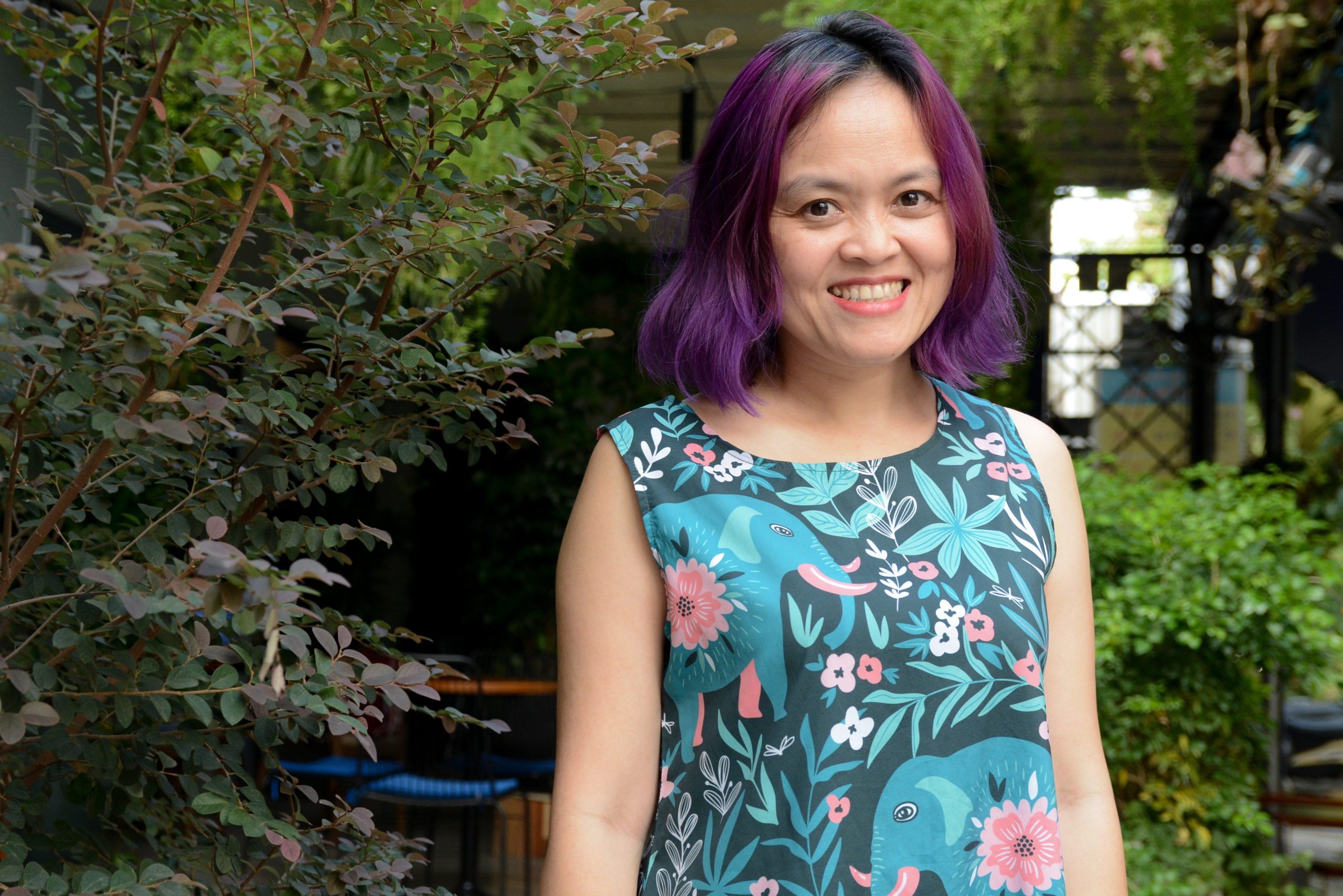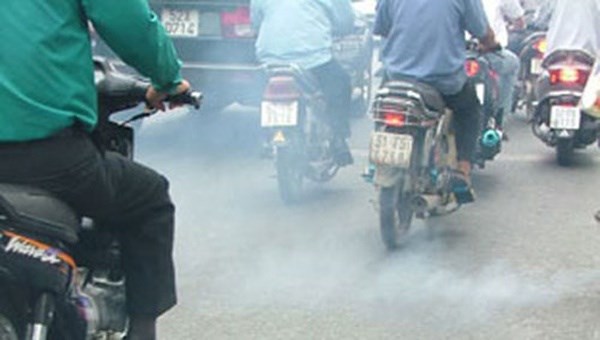I was worried I wouldn’t be able to pick out Hong in the bustling café near her office. I needn’t have. Her hair, currently a bright fluorescent purple, stands out as a beacon of non-conformity amongst a sea of sameness. With an equally vibrant coloured dress, she was impossible to ignore. It’s safe to assume she’s comfortable standing out in a crowd.
Doing something different is clearly working out well. Hong has an impressive list of accolades and holding the reins of CHANGE, her own environmental non-profit, is only one of them. During our brief meeting we discussed the trials and tribulations of how she approached and overcame the many difficulties she faced in her early career, why she founded CHANGE, and how the current COVID-19 pandemic has the potential to finally stop Vietnam’s notorious role in the illegal wildlife trade.
Finding a Passion
You need to know where you want to go before you know which road to take. It’s a timeless concept but it rarely plays out in reality and Hong’s entry into adulthood was no different. As she entered university she was enveloped by confusion and chaos as she looked towards Europe. “With the Soviet Empire collapsing I began to question the entire socialist system that I had spent my whole life studying,” stated Hong.
She clearly remembers her anxiousness but also the absolute clarity – the only choice was to adapt. Without much hesitation she added English as a second major to her original degree in Russian and assumed she would probably end up as a teacher or translator. She loved language but studying it was more of a reflexive progression rather than a considered choice.
The mid-90s was an exciting time to be in Vietnam. The country was experiencing its own market reformation and many foreign companies began to invest. As a fresh graduate, Hong landed a dream job in the marketing department at a new business newspaper based in Hanoi. Her exposure to such a diverse and international team began to re-align her world-view and as great as the job was, she became restless and couldn’t shake the feeling that she had to do something else.
A friend told Hong about a competition she saw for youth to visit Antarctica in the summer of 1997. Organized by Robert Swan, the famed polar explorer, the 6-week trip was designed to expose the complexities of the climate and the waste issues putting a strain on our planet. After training and embarkation procedures Hong and the team spent a total of 16 days “on the ice”, as they say.
Even now Hong finds it hard to imagine her luck: “At the time my understanding of the environment was almost nothing. I knew very little about global issues and had only heard about some problems like CFCs and litter.” To her defense, there were very few that knew much back then. “The trip was the start of everything for me – if I applied for something like that now, with everyone’s current access to social media, I doubt I would have had this chance.”
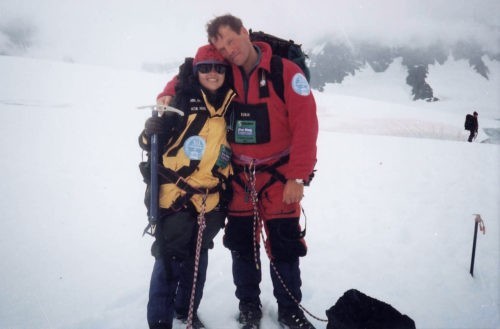
The team was made up of 35 participants from 25 countries and a range of backgrounds. The trip aimed to teach climate science, recognize threats to the environment, and to foster leadership skills by facing challenges and cooperating to overcome adversity.
Coincidentally Hong also became the first Vietnamese to step foot on the southern ice sheets. “I love adventure and to take risks but it was the diversity of views and amazing people I met that inspired the most and instilled in me the need to find and follow my passion throughout my life”. During this trip, Hong realized that her passion was with people, leadership, and protecting this amazing planet we all call home.
Steps Along the Way
Hong had become somewhat of a celebrity and when she returned back to Vietnam the media and universities were all over her to “make public speaking appearances and share the story with them.” However, after a few months of non-stop interviews and talks, she was drained and felt at a loss of where to go next. All she knew is that she wanted to join a non-profit – it was the best way to work directly and influence behavioral change.
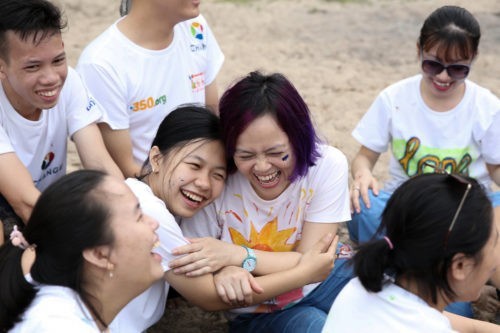
Hong quit her marketing job but failed to find a role she was passionate about. “Back then Vietnam was home to very few NGOs let alone environmental ones,” Hong remembers. Never one to sit back and wait for an opportunity, Hong spent her post-Antarctica years raising funds and awareness for several youth-led environmental awareness campaigns and clean-up events but the money and momentum eventually ran out.
After re-joining the workforce Hong could hardly believe her eyes when she saw WWF scouting for a Hanoi-based regional marketing and communications manager. Her time at WWF was when she “really learned about environmental issues and how to be a serious conservationist” and where her attention would also shift towards wildlife and biodiversity.
Nguyen Dao Ngoc Van, a project manager and policy advisor at WWF Vietnam, worked with Hong on a campaign during this period which aimed to raise awareness on and to reduce illegal wildlife consumption. Over the program’s four years they developed a variety of creative events and material to support the campaign – from campaign ads, to a trans-Vietnam run and even a masquerade ball. Van remembers how “Hong always approached challenges with a passion like few others and it always inspired the team to come together in times of doubt.”
They both shared an important lesson of censorship and approval during their time at WWF. Van remembers: “We made a big mistake in assuming our artwork would be suitable and lost a lot of time and money.” After designing and producing all the promotional material for a particular campaign their use of flames in the logo was denied by the Vietnamese authorities. Precious time and money had been wasted yet an important lesson learned – the “need to get prior approval to almost everything we did.”
After several enriching years at WWF, Hong moved with her husband and young son to Vietnam’s southern megalopolis, Ho Chi Minh City, for a new challenge. Similarly to years before in Hanoi, there were few NGOs, let alone environmentally-focused ones, yet Hong saw this an opportunity to test herself again while continuing to spread the awareness of environmental issues.
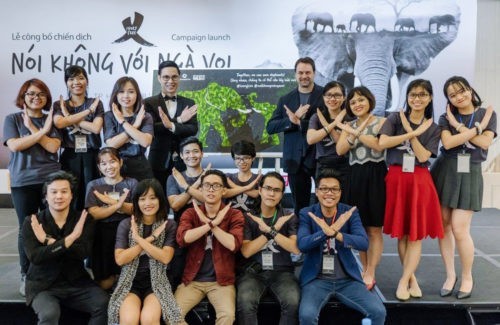
Hong contacted 350.org with a proposal. “I simply got in touch with them and explained my experience and desire to support their message and enhance their presence here. After some discussions, I was given a coordination role in Vietnam, and later on, the region.” She smiled proudly. The youth-led grassroots movement got plenty of traction in only a few short years and it allowed Hong to hone her skills at doing what she loves – conducting creative campaigns for youth engagement in environmental protection.
The legal status of 350.org in Vietnam would soon slow things down. “Being a global movement and not an organization as such, it was impossible to get local registration,” and without acquiring legal status it was difficult to raise funds and sustain the program. This spurred the development of CHANGE whom till this day still has a close and cooperative relationship with 350.org.
Along Came CHANGE
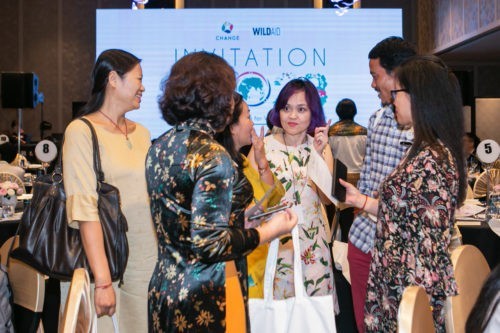
The lessons learned and skills developed would finally culminate in CHANGE, Hong’s very own fully-fledged Vietnamese environmental NGO. Officially formed in 2013, CHANGE is an acronym for the Centre of Hands-on Actions and Networking for Growth and Environment. Its work covers three main categories: climate change, wildlife, and sustainability but its main aim is simply to “educate individuals and mobilize the community into taking action on reducing their impact on our most serious environmental issues.” The notion of recognizing the individual as the driving factor behind change mimics the lessons Hong had learned early in her career.
In the early days Hong had struggled to keep CHANGE afloat. “ I underestimated the challenges in financing, human resources and legalities and we had a lot of troubles managing money and the team in general. I feel as though we may have lost trust with some partners back then.” In addition to internally strengthening her organisation, Hong soon learnt the benefits of cooperation with other organisations and is currently a firm prerequisite for any campaign. WildAid has been an integral partner since the early days but CHANGE maintains a strong network of partners with 350.org and several local NGOs such as GreenID, LIN Centre for Community Development, the Center for Media in Educating Community (MEC), and the centre of Law and Policy of Sustainable Development (LPSD).
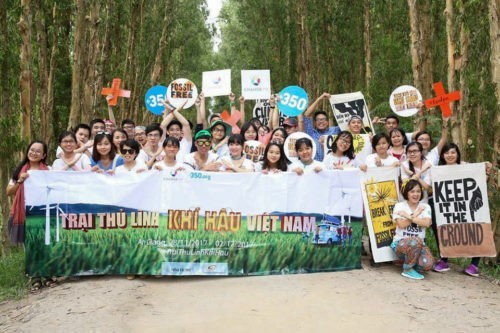
CHANGE currently has about 20 full-time employees who share the same desire for preserving their environment and its creatures. Nhi Thoi CHANGE’s managing director, has been somewhat of a protégé of Hong’s for the last 7 years.
Like so many of us, Nhi also used to question the effectiveness of individual action on such large issues. However, working with Hong “has helped me understand and observe how the snowball effect works and how it creates the collective change needed to influence policy.” Nhi has faced challenges alongside Hong like the ever-continuing struggles many small NGOs face with funding and a high turnover rate of staff. Local non-profits and experienced leaders like Hong are providing crucial opportunities for young Vietnamese, like Nhi, to learn about activism and continue to develop skills and positively influence their society.
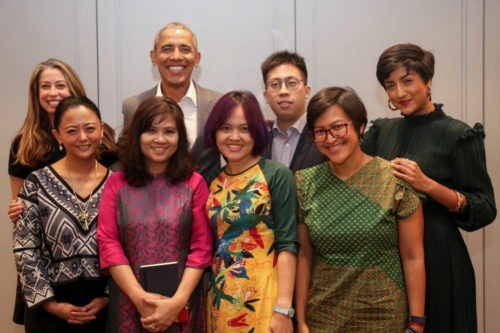
In 2018 Hong was able to add yet another bow to her leadership string after she was accepted into the inaugural round of the Obama Foundation Scholars Program. This program is designed to bring together rising leaders from around the globe to build their proven talents and knowledge through collaboration, innovative problem-solving and skills-based hands-on learning. The opportunity to spend time beside some of the world’s most talented leaders at an institution like Columbia University as a “dream come true” for Hong.
COVID-19 and the Illegal Wildlife Trade
CHANGE has always been concerned with protecting wildlife but it’s focus has been intensified over the past few months due to the COVID pandemic. Suspected to have spread from a wet market in Wuhan, China, the spotlight on the illegal wildlife trade and the inevitable spread of deadly diseases from animals to humans has never been so intense.
According to National Geographic statistics, not only is Vietnam one of the world’s largest consumers, but it also contains some of the busiest transport routes and the largest stockpiles of ivory and pangolin scales. Although the exact source of COVID-19 transmission is yet to be determined, there is reason to believe that the consumption of pangolin products may have been involved in the spread.
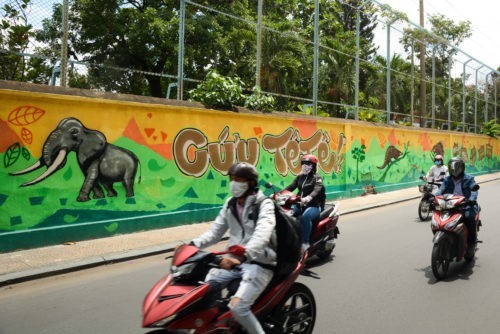
“People were initially scared [of the virus] and there was an initial slowdown in demand and consumption,” stated Hong. Due to Vietnam’s role in the illegal wildlife trade the government, CHANGE and others were quick to react to the threat and everyone agreed for the need to enhance laws and enforcement to minimize the threat.
On 27 March CHANGE held an online workshop with health, law and media experts along with representatives from the Ministry of Agriculture and Rural Development (MARD) to voice their concerns and suggest changes to the current laws and notoriously weak enforcement of both trafficking and use of illegal wildlife products.
The initial seriousness of this action was great news for activists who had been voicing concerns for years. There are fears, however, that the initial reaction and momentum may fall flat due to Vietnam’s efforts to successfully contain the spread of the virus and consequently, reducing the threat. After self-quarantine measures are reduced and most of the economy begins to open again, Hong and others who took part in the workshop, are worried that things will return to normal before crucial changes are made. The Prime Minister is expected to announce any ammendendents and policy directives within regards to illegal wildlife trafficking within the coming weeks.
Hong, like many others, are eagerly awaiting the announcement of these new laws as they have the potential to make a huge impact. On a more personal note, she looks forward to a day soon where she can step back from her current role at CHANGE and allow it to become more of a community driven entity. She plans to spend her time catching up on lost time with her son and has a dream to develop a program where she can continue to encourage young Vietnamese to develop and carry on the flame as passionate and responsible leaders.


